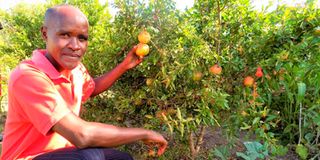Joy of running a mixed fruit farm

Stephen Mwanzia’s orchard hosts over 10 different varieties of fruits, which enables him to get income all year round when each is in season.
A cool breeze blows from the hills yonder as the Seeds of Gold team ventures into Stephen Mwanzia’s orchard near Komarock Shrine in Matungulu, Machakos County.
The 41-year-old grows a variety of fruits, from oranges to guavas, pawpaws, bananas, blackberries, passion, grapes, mangoes and loquats.
The fruits are at various stages of growth; some are green, others red while the rest are flowering.
Mwanzia, who ventured into fruit farming over four years ago, says he invested some Sh1,000 in the agribusiness, which went on seedlings atSh100 each.
“I used to buy seedlings in bits. My first stock consisted of 10 mango seedlings, I then added more with time,” he recalls
He has planted the fruit trees randomly on the farm. “My farm is half-acre but I have managed to plan everything to fit on it,” says Mwanzia, adding he planted them leaving an equal distance for uniform growth and to allow orchard operations like irrigation, spraying of plants and harvesting to be done easily.
Fruit seedlings
To plant the fruit seedlings, he digs a hole of 2 feet by 2 feet by 2 feet. Then he mixes the soil with organic manure from sheep or cows and puts in the hole to reach about 1ft.
“But you first put a small amount of sand and place the soil mixed with manure on top and plant the crop. The sand will help retain soil moisture and it will make the roots to develop faster. When there is a dry spell, mulch the crop so that when you irrigate the plant, moisture is returned in the soil,” he explains.
The fruit trees, he adds, need plenty of water thus one can use innovative methods to irrigate them.
“You can cut plastic bottles at the bottom, make a small hole on the lid and place it upside down. You will be filling up the bottle with water. Depending on the capacity of the container, the plant can use the water for even three weeks. This is the method I use,” he explains.
According to him, running a mixed fruit farm comes with a variety of benefits that include selling different fruits every time they are in season.
“When I finish selling pomegranates, my pawpaws are ready and after that I move to oranges. This enables me to have produce all year round. But if you rely on one type of fruit like mangoes, when the season is over, you will have to wait until the next.”
Blackberries
Mwanzia says pomegranates take three years to bear fruits, same as guavas and grapes whereas blackberries two. On the other hand, pawpaws take a year, passion six months, mangoes four as well as loquats.
Mwanzia sells his fruits to traders and consumers who visit his farm. A kilo of pomegranates goes for Sh800, passion fruits Sh80 and sweet bananas from Sh1,000 to Sh1,500 a bunch.
Carol Mutua, a crop production specialist from Egerton University, says to successfully run such a farm, one should decide on the fruits to grow depending on available market and climate.
“One should also consider the method of irrigation to use or the source of water to be used in the farm. The cheaper the irrigation system, the better.”
Mutua notes that security of the fruit trees is also important as well as drainage of the area.
“Accessibility to the market in terms of transport should further be considered as fruits can be bulky or one can go at a loss if ferrying the fruits to the buyer becomes a challenge.”
Passion fruits, according to her, require trellis for support. This should be made from wooden poles about 2.5m high and strong galvanised wires of about 7m (20ft) to allow maximum exposure to sunlight.





